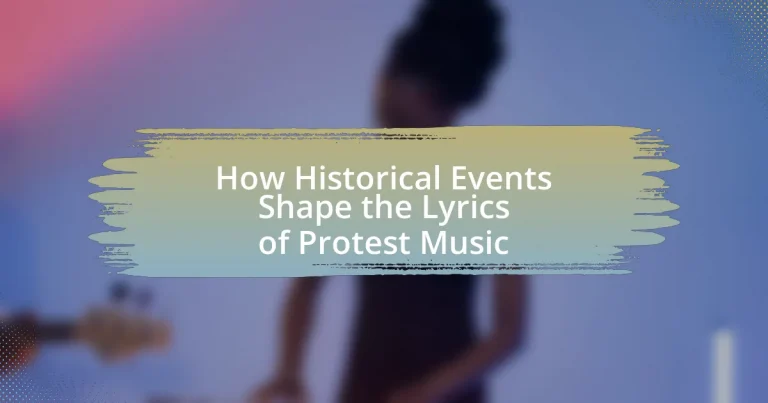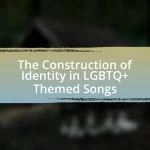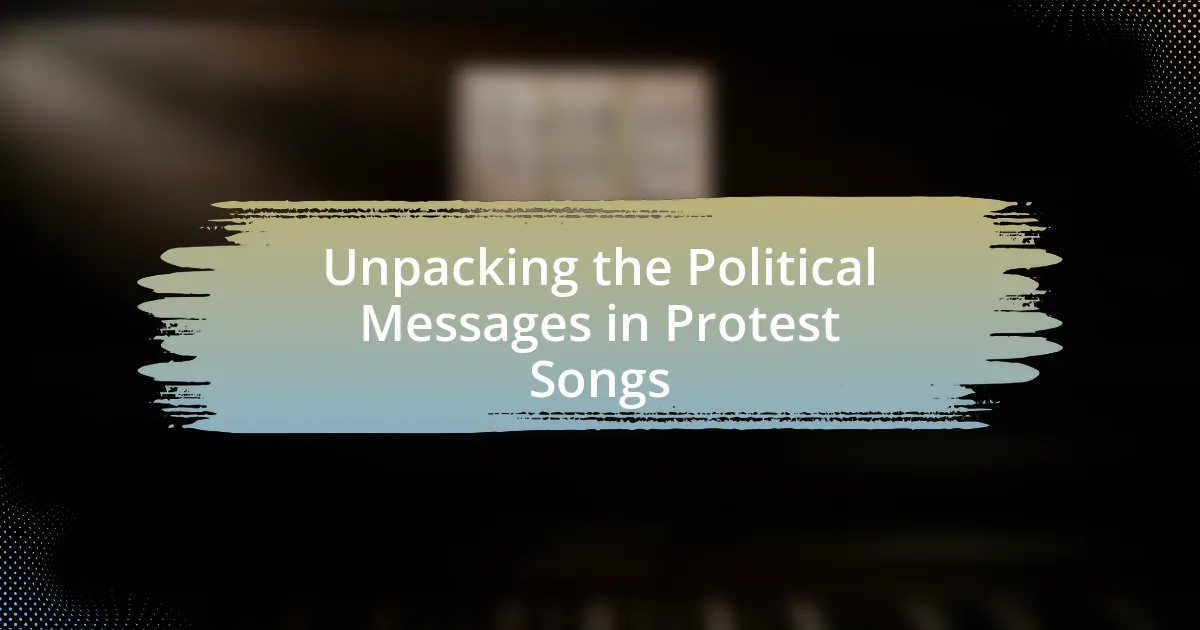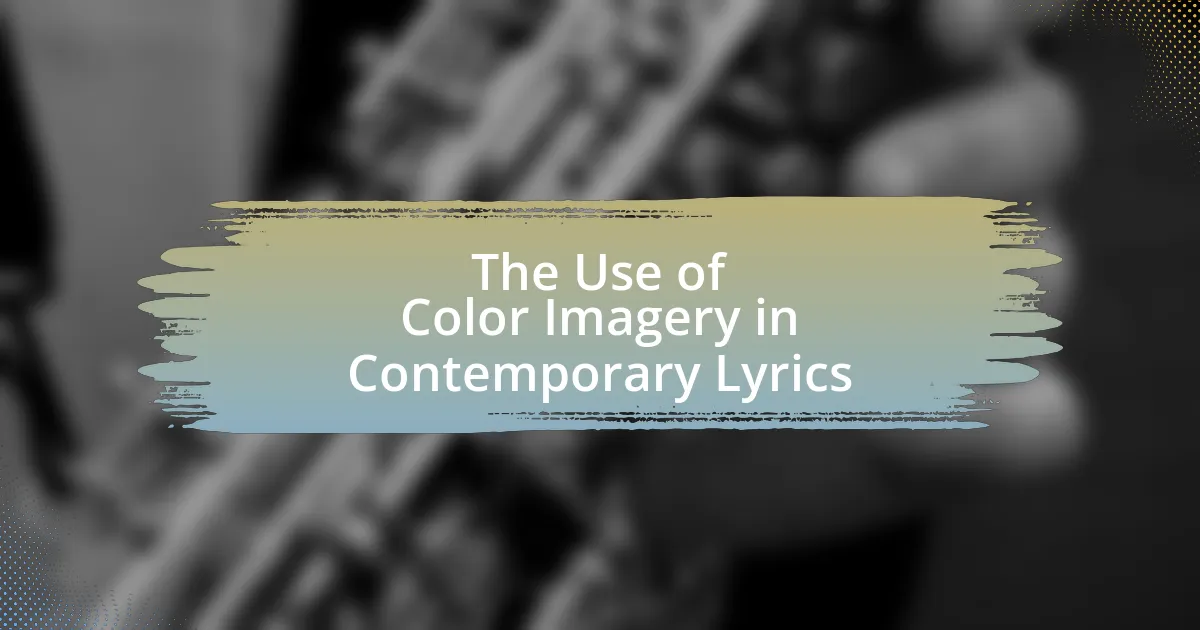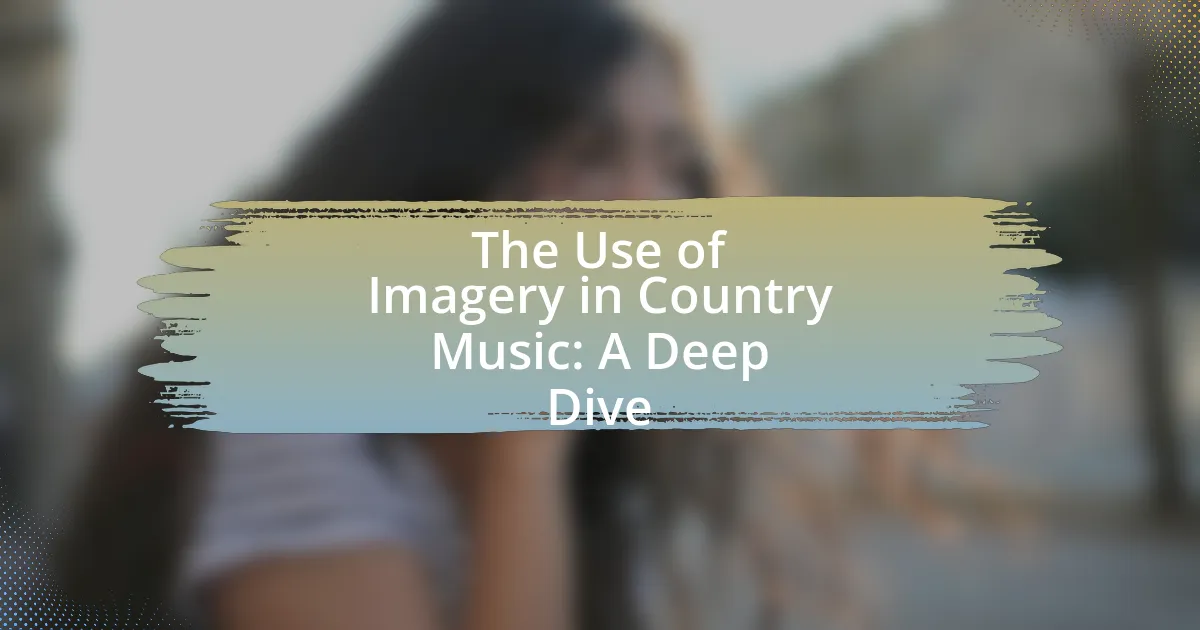The article examines how historical events shape the lyrics of protest music, highlighting the connection between significant social movements and the themes expressed in songs. It discusses key historical events such as the Civil Rights Movement, the Vietnam War, and the anti-apartheid movement, illustrating how artists like Bob Dylan and Nina Simone used their music to address issues of racial injustice, war, and inequality. The analysis emphasizes the importance of understanding the socio-political context of protest music, revealing how lyrics reflect the sentiments of their time and serve as a powerful medium for social change. Additionally, it explores the role of personal narratives in connecting individual experiences to broader historical events, enhancing the emotional impact of protest songs.
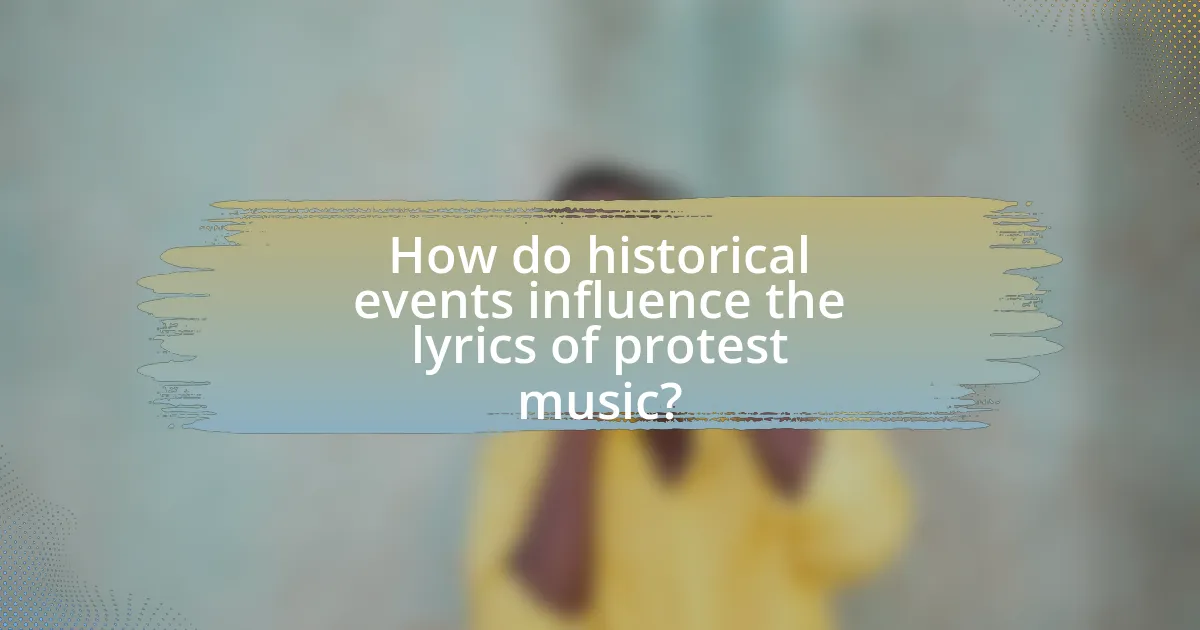
How do historical events influence the lyrics of protest music?
Historical events significantly influence the lyrics of protest music by providing context and themes that resonate with societal struggles. For instance, during the Civil Rights Movement in the 1960s, artists like Bob Dylan and Nina Simone wrote songs that addressed racial injustice and inequality, reflecting the urgent social issues of the time. The song “Mississippi Goddam” by Nina Simone directly responded to the assassination of civil rights leader Medgar Evers and the 1963 Birmingham church bombing, illustrating how specific events shaped the lyrical content to convey anger and demand change. Similarly, the Vietnam War inspired numerous protest songs, such as “Fortunate Son” by Creedence Clearwater Revival, which criticized the disparity between those who were drafted and those who could avoid service, highlighting the social and political discontent of that era. These examples demonstrate that protest music serves as a powerful medium for expressing collective grievances rooted in historical events.
What are the key historical events that have shaped protest music?
Key historical events that have shaped protest music include the Civil Rights Movement, the Vietnam War protests, and the anti-apartheid movement. The Civil Rights Movement in the 1960s, marked by figures like Martin Luther King Jr., inspired songs such as “We Shall Overcome,” which became anthems for social justice and equality. The Vietnam War protests in the late 1960s and early 1970s led to powerful songs like Bob Dylan’s “Blowin’ in the Wind,” reflecting widespread opposition to the war and advocating for peace. Additionally, the anti-apartheid movement in South Africa, highlighted by artists like Hugh Masekela and Miriam Makeba, produced music that raised global awareness about racial injustice and mobilized support for change. These events collectively influenced the themes, styles, and messages of protest music, making it a vital tool for social and political expression.
How did the Civil Rights Movement impact protest music lyrics?
The Civil Rights Movement significantly influenced protest music lyrics by embedding themes of social justice, equality, and resistance against oppression. Artists like Bob Dylan and Nina Simone incorporated the struggles and aspirations of the movement into their songs, using powerful imagery and direct references to civil rights issues. For example, Dylan’s “The Times They Are a-Changin'” became an anthem for change, reflecting the urgency of the movement, while Simone’s “Mississippi Goddam” explicitly addressed racial violence and injustice. These lyrics not only resonated with the experiences of African Americans but also galvanized broader public support for civil rights, illustrating how the movement shaped the narrative and emotional depth of protest music during that era.
What role did the Vietnam War play in the evolution of protest music?
The Vietnam War significantly influenced the evolution of protest music by serving as a catalyst for artists to express dissent against government policies and military actions. During the 1960s and early 1970s, musicians like Bob Dylan, Joan Baez, and Creedence Clearwater Revival used their platforms to address the moral implications of the war, reflecting widespread public discontent. Songs such as “Blowin’ in the Wind” and “Fortunate Son” became anthems for the anti-war movement, articulating the frustrations and fears of a generation. The war’s impact on society led to a surge in music that critiqued authority and advocated for peace, marking a pivotal shift in the role of music as a form of political expression.
Why is it important to analyze the lyrics of protest music in a historical context?
Analyzing the lyrics of protest music in a historical context is crucial because it reveals the socio-political climate that influenced the creation of the music. Historical events, such as civil rights movements, wars, and social upheavals, shape the themes and messages within protest songs, providing insight into the struggles and sentiments of the time. For example, songs from the 1960s civil rights movement, like “A Change Is Gonna Come” by Sam Cooke, reflect the fight against racial injustice and the hope for equality, directly tied to the events of that era. Understanding these connections allows listeners to grasp the significance of the music as a form of resistance and expression, highlighting how artists respond to and critique their societal conditions.
How do lyrics reflect the sentiments of their time?
Lyrics reflect the sentiments of their time by encapsulating the social, political, and emotional climate of specific historical moments. For instance, during the civil rights movement in the 1960s, songs like “A Change Is Gonna Come” by Sam Cooke expressed the struggles and hopes of African Americans, resonating with the widespread demand for equality and justice. This connection between lyrics and societal issues illustrates how artists respond to and influence public sentiment, making music a powerful medium for protest and reflection.
What can we learn about societal changes through protest music lyrics?
Protest music lyrics reveal significant insights into societal changes by reflecting the political, social, and cultural climates of their times. For instance, songs from the Civil Rights Movement, such as “We Shall Overcome,” encapsulated the struggle for racial equality and highlighted the collective desire for justice, illustrating how music can serve as a catalyst for social awareness and mobilization. Additionally, contemporary protest songs addressing issues like climate change or systemic inequality demonstrate ongoing societal concerns, showing that music continues to evolve in response to current events. This connection between lyrics and historical context underscores the role of protest music as both a mirror and a motivator for societal transformation.
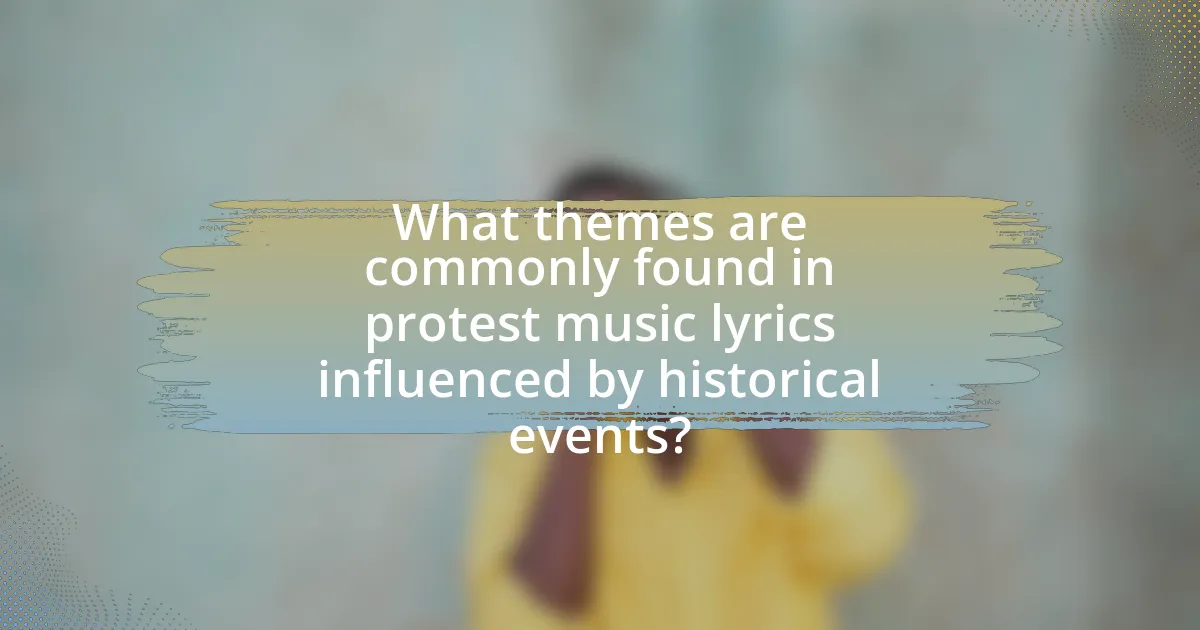
What themes are commonly found in protest music lyrics influenced by historical events?
Common themes found in protest music lyrics influenced by historical events include social justice, civil rights, anti-war sentiments, and economic inequality. These themes often reflect the struggles and aspirations of marginalized groups during significant historical moments, such as the Civil Rights Movement in the 1960s, which inspired songs advocating for racial equality and justice, like “A Change is Gonna Come” by Sam Cooke. Similarly, anti-war protests during the Vietnam War era produced powerful anthems like “Fortunate Son” by Creedence Clearwater Revival, highlighting class disparities in military service. Economic inequality is also a recurring theme, as seen in songs like “The Message” by Grandmaster Flash and the Furious Five, which addresses urban poverty and systemic oppression. These examples illustrate how protest music serves as a vehicle for expressing collective grievances and mobilizing social change in response to historical injustices.
How do themes of injustice and inequality manifest in protest music?
Themes of injustice and inequality manifest in protest music through lyrics that directly address social issues, highlight systemic oppression, and call for change. For example, songs like “Fight the Power” by Public Enemy explicitly confront racial discrimination and advocate for empowerment, reflecting the civil rights struggles of the 1980s. Similarly, “Alright” by Kendrick Lamar addresses police brutality and systemic racism, resonating with the Black Lives Matter movement. These songs serve as both a reflection of historical injustices and a rallying cry for marginalized communities, illustrating how music can encapsulate the emotional and political landscape of its time.
What specific lyrics illustrate the fight against racial injustice?
Specific lyrics that illustrate the fight against racial injustice include “We shall overcome” from the civil rights movement anthem, which emphasizes resilience and hope in the face of oppression. This phrase became a rallying cry during protests against segregation and discrimination, symbolizing the collective struggle for equality. Additionally, “Black man, you are a king” from the song “Black Man” by Stevie Wonder highlights the dignity and worth of Black individuals, challenging systemic racism and celebrating heritage. These lyrics reflect the historical context of the civil rights movement and the ongoing fight against racial injustice, reinforcing the message of empowerment and unity.
How do protest songs address economic inequality?
Protest songs address economic inequality by highlighting the struggles of marginalized communities and critiquing systemic injustices. These songs often use powerful lyrics to convey the experiences of those affected by poverty, unemployment, and wealth disparity, making the issues relatable and urgent. For example, songs like “The Message” by Grandmaster Flash and the Furious Five explicitly discuss the harsh realities of urban poverty and the lack of opportunities, illustrating the impact of economic inequality on daily life. Additionally, historical contexts, such as the Great Depression or the Occupy Wall Street movement, have inspired artists to create music that resonates with listeners facing similar challenges, reinforcing the message that economic inequality is a pervasive and pressing issue.
What role does personal narrative play in protest music lyrics?
Personal narrative plays a crucial role in protest music lyrics by providing a relatable and emotional context that resonates with listeners. This personal storytelling allows artists to convey their experiences and perspectives on social injustices, making the message more impactful. For instance, songs like “Fight the Power” by Public Enemy incorporate personal narratives that reflect the struggles of marginalized communities, thereby connecting individual experiences to broader societal issues. This connection enhances the emotional weight of the lyrics, fostering solidarity and encouraging collective action among listeners.
How do artists use their personal experiences to connect with broader historical events?
Artists connect their personal experiences to broader historical events by infusing their narratives and emotions into their work, creating relatable and impactful expressions of societal issues. For instance, during the Civil Rights Movement, artists like Nina Simone drew from her own experiences of racial discrimination to craft songs such as “Mississippi Goddam,” which directly addressed the injustices faced by African Americans. This personal connection not only humanizes the historical context but also resonates with audiences, fostering a collective understanding of the struggles depicted. By intertwining their individual stories with significant historical moments, artists effectively amplify the emotional weight of these events, making them more accessible and poignant to listeners.
What examples exist of protest songs that tell personal stories related to historical events?
Examples of protest songs that tell personal stories related to historical events include “The Ballad of Sacco and Vanzetti” by Woody Guthrie, which reflects the injustices faced by two Italian immigrants wrongfully convicted of murder in the 1920s. Another example is “Fortunate Son” by Creedence Clearwater Revival, which critiques the privilege of those who evade the draft during the Vietnam War, highlighting the personal impact on working-class individuals. Additionally, “Strange Fruit” by Billie Holiday addresses the lynching of African Americans in the South, providing a haunting personal narrative tied to the historical context of racial violence. These songs illustrate how personal experiences are intertwined with significant historical events, making the protest more relatable and impactful.
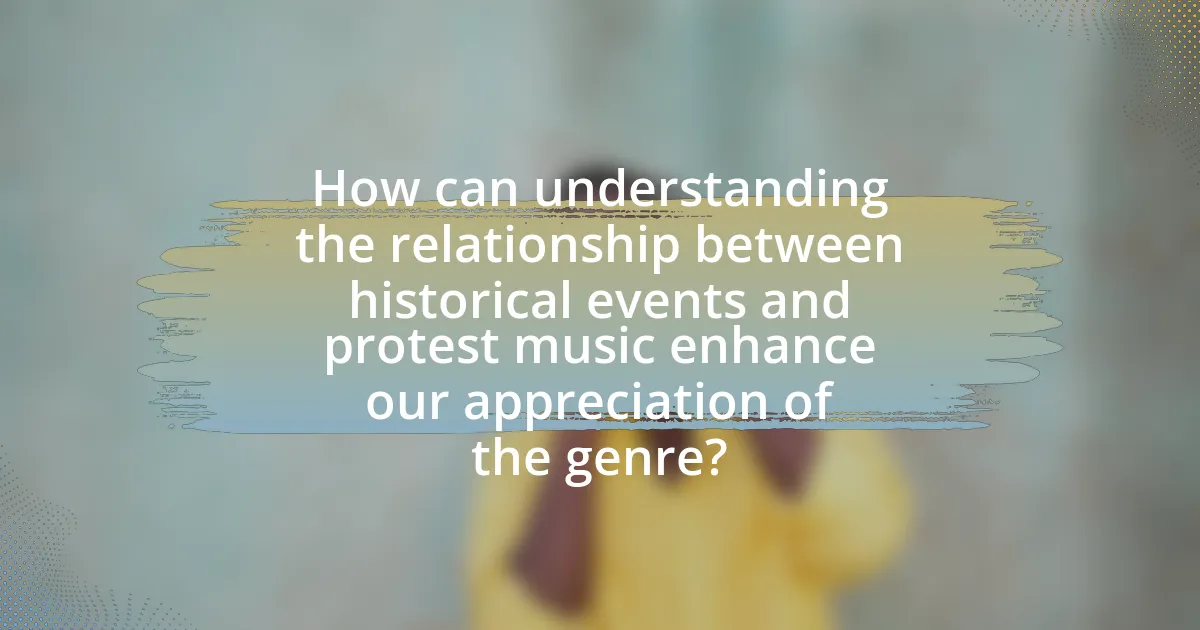
How can understanding the relationship between historical events and protest music enhance our appreciation of the genre?
Understanding the relationship between historical events and protest music enhances our appreciation of the genre by providing context that deepens the emotional and cultural significance of the songs. For instance, songs like “Fortunate Son” by Creedence Clearwater Revival, which critiques the Vietnam War and class disparity, resonate more profoundly when one recognizes the socio-political climate of the 1960s. This connection allows listeners to grasp the motivations behind the lyrics and the urgency of the messages being conveyed, thereby enriching their overall experience of the music. Historical events serve as a backdrop that informs the themes, emotions, and calls to action present in protest music, making it a powerful tool for social commentary and change.
What skills can listeners develop by analyzing protest music lyrics in context?
Listeners can develop critical thinking, contextual analysis, and empathy by analyzing protest music lyrics in context. Critical thinking skills are enhanced as listeners evaluate the motivations behind the lyrics and the historical events that inspired them, such as the Civil Rights Movement or anti-war protests. Contextual analysis skills improve as listeners learn to interpret the social, political, and cultural factors influencing the music, allowing them to connect the lyrics to broader societal issues. Empathy is fostered as listeners engage with the emotions and experiences expressed in the lyrics, promoting a deeper understanding of the struggles faced by marginalized communities. These skills are essential for comprehending the complex interplay between music and historical events, ultimately enriching the listener’s perspective on social justice and activism.
How can critical listening improve our understanding of social issues presented in protest music?
Critical listening enhances our understanding of social issues in protest music by enabling listeners to analyze lyrics, context, and emotional delivery. This analytical approach allows individuals to discern the underlying messages and historical references embedded in the music, which often reflect societal struggles and injustices. For instance, songs like “Fight the Power” by Public Enemy address systemic racism and inequality, prompting listeners to engage with the socio-political climate of the time. By critically evaluating the music, listeners can connect personal experiences with broader social movements, fostering a deeper comprehension of the issues at hand.
What methods can be used to analyze the lyrics of protest songs effectively?
To analyze the lyrics of protest songs effectively, one can employ methods such as thematic analysis, linguistic analysis, and historical contextualization. Thematic analysis involves identifying recurring themes and motifs within the lyrics, which can reveal the underlying messages and societal issues being addressed. Linguistic analysis focuses on the language, tone, and rhetorical devices used in the lyrics, providing insight into the emotional impact and persuasive strategies employed by the artists. Historical contextualization situates the lyrics within the specific socio-political events that inspired them, allowing for a deeper understanding of the protest’s significance and relevance. For instance, analyzing Bob Dylan’s “The Times They Are a-Changin'” in the context of the civil rights movement highlights how the lyrics reflect the urgency for social change during that era.
What are some practical ways to engage with protest music today?
To engage with protest music today, individuals can actively listen to contemporary protest songs, participate in discussions about their themes, and share them on social media platforms. Engaging with protest music involves understanding the historical context that shapes the lyrics, as many songs address current social issues rooted in past events, such as civil rights movements or anti-war sentiments. For instance, artists like H.E.R. and Kendrick Lamar incorporate historical references in their lyrics to highlight ongoing struggles against systemic racism, making their music relevant to today’s social justice movements. By attending live performances, joining online forums, or creating playlists that feature protest music, listeners can foster a deeper connection to the messages conveyed through these songs.
How can individuals use protest music to advocate for social change in their communities?
Individuals can use protest music to advocate for social change in their communities by creating and sharing songs that address social issues, mobilize support, and inspire action. This form of expression has historically been effective; for example, during the Civil Rights Movement, artists like Bob Dylan and Nina Simone used their music to highlight racial injustice and galvanize public sentiment. By incorporating relatable narratives and powerful melodies, protest music can resonate with listeners, fostering a sense of community and urgency around specific causes. Furthermore, platforms such as social media allow individuals to disseminate their protest songs widely, amplifying their message and encouraging collective engagement in social movements.
What resources are available for exploring the history of protest music and its lyrics?
Resources available for exploring the history of protest music and its lyrics include academic books, documentaries, online archives, and scholarly articles. Notable academic books such as “Songs of Protest, War, and Peace: A Bibliography and Discography” by John Greenway provide comprehensive insights into the genre. Documentaries like “The Sixties: The Years That Shaped a Generation” offer visual context and analysis of protest music’s evolution. Online archives, such as the Smithsonian Folkways Recordings, house extensive collections of protest songs and their historical backgrounds. Scholarly articles in journals like “The Journal of American Folklore” analyze the cultural significance and lyrical content of protest music, providing a deeper understanding of how historical events influence its themes.
